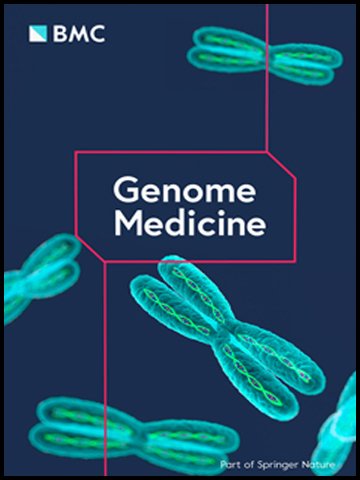Colorectal cancer microbiome programs DNA methylation of host cells by affecting methyl donor metabolism
IF 10.4
1区 生物学
Q1 GENETICS & HEREDITY
引用次数: 0
Abstract
Colorectal cancer (CRC) arises from complex interactions between host and environment, which include the gut and tissue microbiome. It is hypothesized that epigenetic regulation by gut microbiota is a fundamental interface by which commensal microbes dynamically influence intestinal biology. The aim of this study is to explore the interplay between gut and tissue microbiota and host DNA methylation in CRC. Metagenomic sequencing of fecal samples was performed on matched CRC patients (n = 18) and healthy controls (n = 18). Additionally, tissue microbiome was profiled with 16S rRNA gene sequencing on tumor (n = 24) and tumor-adjacent normal (n = 24) tissues of CRC patients, while host DNA methylation was assessed through whole-genome bisulfite sequencing (WGBS) in a subset of 13 individuals. Our analysis revealed substantial alterations in the DNA methylome of CRC tissues compared to adjacent normal tissues. An extensive meta-analysis, incorporating publicly available and in-house data, identified significant shifts in microbial-derived methyl donor-related pathways between tumor and adjacent normal tissues. Of note, we observed a pronounced enrichment of microbial-associated CpGs within the promoter regions of genes in adjacent normal tissues, a phenomenon notably absent in tumor tissues. Furthermore, we established consistent and recurring associations between methylation patterns of tumor-related genes and specific bacterial taxa. This study emphasizes the pivotal role of the gut microbiota and pathogenic bacteria in dynamically shaping DNA methylation patterns, impacting physiological homeostasis, and contributing to CRC tumorigenesis. These findings provide valuable insights into the intricate host-environment interactions in CRC development and offer potential avenues for therapeutic interventions in this disease.结直肠癌微生物组通过影响甲基供体代谢来控制宿主细胞的 DNA 甲基化
大肠癌(CRC)源于宿主与环境(包括肠道和组织微生物群)之间复杂的相互作用。据推测,肠道微生物群的表观遗传调控是共生微生物动态影响肠道生物学的基本界面。本研究旨在探讨肠道和组织微生物群与宿主 DNA 甲基化在 CRC 中的相互作用。对匹配的 CRC 患者(18 人)和健康对照组(18 人)的粪便样本进行了元基因组测序。此外,还对 CRC 患者的肿瘤组织(n = 24)和肿瘤邻近的正常组织(n = 24)进行了 16S rRNA 基因测序,对组织微生物群进行了分析,并通过全基因组亚硫酸氢盐测序(WGBS)对 13 人的宿主 DNA 甲基化进行了评估。我们的分析表明,与邻近的正常组织相比,CRC 组织的 DNA 甲基组发生了重大改变。一项广泛的荟萃分析结合了公开和内部数据,确定了肿瘤和邻近正常组织之间微生物衍生的甲基供体相关通路的显著变化。值得注意的是,我们观察到邻近正常组织中基因启动子区域内微生物相关的 CpGs 明显富集,而肿瘤组织中明显没有这种现象。此外,我们还发现肿瘤相关基因的甲基化模式与特定细菌类群之间存在一致且反复出现的关联。这项研究强调了肠道微生物群和致病菌在动态改变 DNA 甲基化模式、影响生理平衡和导致 CRC 肿瘤发生方面的关键作用。这些发现为了解 CRC 发展过程中错综复杂的宿主-环境相互作用提供了宝贵的见解,并为该疾病的治疗干预提供了潜在的途径。
本文章由计算机程序翻译,如有差异,请以英文原文为准。
求助全文
约1分钟内获得全文
求助全文
来源期刊

Genome Medicine
GENETICS & HEREDITY-
CiteScore
20.80
自引率
0.80%
发文量
128
审稿时长
6-12 weeks
期刊介绍:
Genome Medicine is an open access journal that publishes outstanding research applying genetics, genomics, and multi-omics to understand, diagnose, and treat disease. Bridging basic science and clinical research, it covers areas such as cancer genomics, immuno-oncology, immunogenomics, infectious disease, microbiome, neurogenomics, systems medicine, clinical genomics, gene therapies, precision medicine, and clinical trials. The journal publishes original research, methods, software, and reviews to serve authors and promote broad interest and importance in the field.
 求助内容:
求助内容: 应助结果提醒方式:
应助结果提醒方式:


